My father, Jack Summers, and Uncle Bill stand between the bridesmaid and Aunt Ivy (the bride in blue).
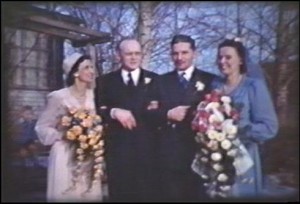
My father had murder on his mind.
Thomas Wolff once said “You can’t go back,” and Edward Albee said, “There are no second acts in American lives.”
Despite this sage advice, I found myself for a few hours, in the city of my birth: Calgary, Alberta. The General Hospital where I was born had been turned into a parking lot to pave the way for a strip mall.
When I was four, my father, who was a dentist in Blairmore, a tiny mining town in the Rocky Mountains, decided we would move to Didsbury.
There are few memories that I have of Didsbury, and I have not been back there for decades. But I remember the silver dollar that I lost in 1948. Over the decades, the value of a Canadian pure silver dollar has risen to about a hundred and fifty dollars.
I knew where I had left the silver dollar in Didsbury. In the old days, it took almost an hour and a half to drive between Calgary and Didsbury, but thanks to a superhighway, it was only twenty-five minutes away. I couldn’t resist, and forty minutes later I was taking the off ramp to Didsbury, the location of my earliest memories on the planet.
What struck me as curious was that as I drove towards Didsbury, I could see the pale outline of the blue Rocky Mountains in the distance. I thought it was strange that I did not have a recollection of those mountains, and as I drove closer to Didsbury, I wondered why.
The answer probably lurked in some kind of baby-perspective I had. Perhaps I couldn’t see over the windshield in my parents’ car, so I had never seen the Rocky Mountains as a toddler. Surely, I thought, I must have seen them when I walked around Didsbury, but I guess I was just too short to see over anything.
I passed the hospital that Doug Paul, an old friend of the family, worked in. Actually, he did more than work in it. As one of the only M.D.s in the area in the 40s, he ran the place with a steel hand in a steel glove.
Doug Paul had died several years ago, and I wanted to visit his grave. He was a frugal Scotsman, and when he heard that gravesites were ten thousand dollars each in Edmonton, he decided he and his wife should be buried in one of the first places that he practiced medicine, amongst many of the patients that he had brought into the world and now were dead.
But before I visited the graves of Doug and his wife, Lucille, I wanted to follow up on the silver dollar that I remembered from so many years ago.
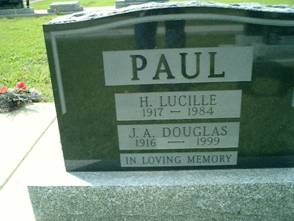
I had no idea what I would find when I passed the town office, a small brick building which was once the telephone exchange. When I was a child everybody had to go through this phone exchange in order to talk to anyone else. The operators always listened in when they had nothing else to do. One of my mother’s best friends was a telephone operator.
I was happy to see that the old telephone exchange had been recycled, and was now a town office. Later, I thought, I would go there and find out where Doug and his wife were buried.
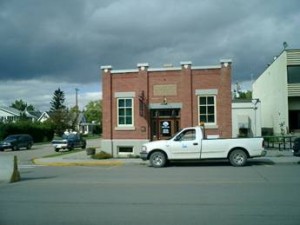
But for now, the old telephone exchange was an anchor to my past and, as I recalled, the house that I had lived in when I was three years old was two lots west.
Someone had torn down our ancient old home and built a rather tacky two-story structure. I felt enormously sad. But then I glanced a little further down the street and saw the house that I had grown up in. Ah, somebody had built a home in the vacant land that had been a part of our large yard.
I walked up to our old home and was amazed to see that it looked almost as I remembered it. It was even the same color. The wooden steps had been replaced with concrete, and the garage, which had been near the alley back, had been moved forward and was now attached to the house.
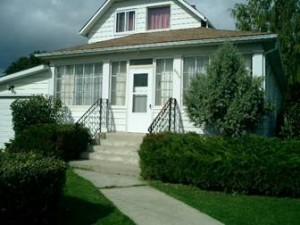
As I knocked on the door, I peered in through the windows of the enclosed verandah and was astonished to see that it was as I remembered it.
Across the street had been a stable, now replaced by a two-story nicely kept home. There was a sign on the door that said, “Barbershop, please go downstairs.” I went downstairs and met a man who said he had lived there for thirty years. He said he was an old-timer.
“Really?” I said. “Do you know who used to live in that house across the street sixty years ago?”
“No,” he said. “I don’t.”
“Me,” I said.
“Well I’ll be damned,” he said. “You must have been just a kid.”
“Well,” I said, “If I’d been grown up, I would be dead right now and we wouldn’t be having this conversation.”
He laughed and told me that the house was now occupied by Charlie Topping. He said Charlie had not been feeling well, and could be playing golf, but that his wife was probably home. We called Toppings, and sure enough, Mrs. Topping was home.
I said, “I want to talk to you about a dollar.” I said the barber could vouch for me, and that one time I had lived in the house she was in. A few minutes later, Mrs. Topping let me into her house.
“What’s this about a dollar?” she said.
I told her that when I was four years old, my uncle had given me a brand new silver dollar. I had decided to hide it. Where? Why, behind the six-inch-high baseboard that ran along the north side of the living room. She turned and saw that the baseboard was still there. It must have been repainted a dozen times since I had lived in the house.
I knelt down and tried to peer behind the baseboard. It had been painted so many times that it looked like it grew out of the wall. I told Mrs. Topping that if she wanted to, I would chop through the baseboard and retrieve the dollar for her, after all it was her house now.
She thanked me for this but said that her husband was not feeling well and such activity would probably upset him, but promised me that some day when they fixed up the living room, she would tell the carpenters where the dollar was.
She showed me the rest of the house, and except for some cupboards that had been refaced, it was as though I was still in the year 1947. I could smell the fresh aroma of cinnamon buns that my mother often had baked for me and my pals when we came in after school. Oh, I forgot: the old wood stove was gone. Just as well, it had a water jacket on it that supplied all the hot water for the house. It took half a day to heat enough water for a bath.
I remember splashing around in a huge claw-foot, cast iron bathtub in the home’s only bathroom. That would be long gone now. Too bad. But it wasn’t gone. There it was. I was amazed to see it, and I remembered the yellow duck that my great aunt Alice had sent me from London. Unlike the plastic ducks of today, this one was made of wood, and was probably covered with many coats of lead paint. I remember chewing on its head. The duck was nowhere in sight.
Mrs. Topping said that when they remodeled the bathroom, they were going to remove the claw-foot tub, but it was too heavy and large to get out of the room.
Here is a picture of the tub that I splashed in as I chewed on the head of a yellow duck when I was four years old.
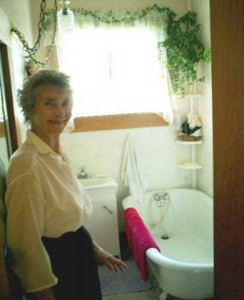
I wanted to see the upstairs, but Mr. Topping was sleeping in one of the tiny bedrooms up there, so I left. In the doorway, I asked Mrs. Topping if she would like to hear a story about the old home. She said she would. Here is the story:
It involves the first time I saw a car accident, possibly the second memory I had as a child. In 1948, my father’s only sister, Ivy, and Bill Zaleschook, an undertaker from Toronto, became engaged. At the time Ivy was working for the Royal Bank of Canada in Calgary, where she was having an affair with a married bank manager.
My mother did not approve of these shenanigans, and had little use for my father’s only sister. However, when Ivy asked if she could have her wedding in our home, both my parents agreed. I did not exactly know what was going on with Ivy, but even in those days I had very large ears and I listened to everything. I knew that my father was quite cross that Ivy had invited her employer, the man she was having an affair with, to her own wedding.
Of course, I did not know what an affair was. I knew nothing of women or their ways until six months later, Maureen Prevot, who lived across the alley, tried to seduce me. That is another story that deals with the wiles of a six year old girl. I did not mention any of this to Mrs. Topping. I did, however, tell her about Ivy and the wedding and the bank manager and my father’s hatred for the bank manager.
On the day of the wedding, Ivy asked that I be sent away. My mother refused. She said I was a part of the family, and I could be there for everything. For this reason I think I was the only child around the wedding.
The guests arrived. It was a rainy, nasty day, and the boulevard outside our home was a torrent of mud. After the wedding, which was in the United Church about six blocks from our house, everyone dashed back through the pelting rain to our home for the reception.
The neighbors had been pressed into service to help with the wedding, and our tiny two-story house had been decorated with white streamers, which soon became soggy ribbons of what looked like old toilet paper, hanging against the downspouts of the gutters. My father had outfitted the enclosed porch with several long steel rods that the wedding guests could hang their coats on.
As the last guest hung up his coat, one of the steel coat hangers collapsed and a huge mass of wet clothing filled our tiny verandah. It looked like a pretty depressing wedding to me, what with the huge pile of wet clothes at the entrance to the festivities. And then there were those streamers of soggy white paper that covered the outside of our house, a waterlogged upside-down cake.
Ivy was upset. She said her wedding was ruined. As it turned out, she hadn’t seen anything yet.
What Ivy had not counted on was my father’s building rage for the older married banker who had seduced my father’s only sister, and now the cad was drinking far more than anyone else at the reception. Despite my mother’s concern, my father started to drink, and soon he and the bank manager were in a contest of who would drink the other one under the table first.
Mother and Ivy became more and more nervous by the minute. The whiskey flowed like the rain, and soon darker clouds filled the sky, and the wedding guests began to leave. Someone said that torrential rains were forecast for later in the evening, and that there was a possibility that the first snowfall of the year would hit our small community. Most of the guests were from out of town and had several hours of driving ahead of them.
I remember the bank manager finishing off a bottle of Canadian Club and announcing that he would be leaving. I don’t think he realized that if my father could have gotten his hands on a rifle, he probably would have shot him. As a matter of fact, earlier in the evening my father had asked my mother where the rifle was, and she told him her brother had borrowed it. This is one of the few times I ever heard my mother lie to my father, and even at my tender age, I realized it was probably for the good of the family, although I must say I thought it would be great fun to have the wedding end in gunfire.
After the bank manager gave Ivy a long and lingering kiss, he and his wife raced out through the rain and jumped in their new Chrysler. They waved to the wedding guests that were left, and I heard my father ask my mother where the ax was. My mother just gave him a cold look. She was relieved to see the manager leaving.
As luck would have it, the Chrysler did not go more than a few feet before it bogged down in axle-deep mud. The man who had seduced Ivy and cheated on his wife rolled his window down and yelled at my father through the rain. “Jack, can you give me a push?”
My father smiled — it was a delicious smile — and nodded affirmatively. My father turned and walked back into the house.
“Where are you going, Jack?” asked my mother.
“He said he needed a push. You don’t expect me to go out there in hip-waders, do you? I’ll use our car.”
“Do you think that’s safe, Jack?” asked my mother.
“Oh, it’s perfectly safe, dear,” said my father. “You just leave everything to me.” He lurched through the few wedding guests and headed out through our back door to the garage.
Mother opened the front door of our house and yelled through the rain to the bank manager that my father would give him a push with his car. The bank manager nodded.
I stood on the verandah for what seemed like an hour, but was probably only three or four minutes. Then I saw, coming through the dusk, the headlights of my father’s Oldsmobile. It was a Rocket 98, one of the largest and most powerful automobiles that you could buy in Canada.
As my mother and I watched in horror, my father accelerated toward the back bumper of the new Chrysler. Like a huge rooster tail of mud, the Oldsmobile kicked up a waterfall of gravel, dirt and oil. Dad hit the bank manager’s car at about fifty miles an hour.
I saw the bank manager’s head bounce off the steering wheel a couple of times and it was obvious, although I could not hear her, that his wife was screaming. Through the relentless rain I could see the satisfied grin on my father’s face. Mission accomplished.
That was the last time we ever saw the bank manager, and although I have no way of proving it, I do not think he ever communicated with my father’s sister again.
After I finished the story, Mrs. Topping, who was standing in our verandah with me, looked out at the placid boulevard. It had long ago been paved, and all that was left now is the memory of that bizarre wedding along with the most of the people who attended it, certainly all of the adults. Gone. Echoes. No more.
Well, there’s still that silver dollar tucked behind the baseboard, waiting for someone to find it.
************
My cousin, Ken Summers, read my story and said that there were a few minutes of a home movie of the wedding. He said he would try and scrounge it up. I was astonished and delighted when Ken had the home movie (shot almost 60 years ago) transferred to disk.
I added a bit of music and a few effects. The film is about the wedding but it’s probably the only time that my father, mother, grandmother and I were in a movie together.
You’ll see someone carrying me out of the church after the wedding and you might wonder why. I was certainly big enough to walk. Well, the reason was that I have overhead my father talking about his hatred for Ivy’s lover and as a result of this I had decided to break up the wedding in the middle of the ceremony.
Just as the final vows were being exchanged in the chapel, I ran down the aisle screaming: “Stop!” Strong hand grabbed me and stronger hands shook me. The bridesmaid scowled at me. Of course none of this is on film.
It was a docile child that is carried out of the chapel in the movie. Later at the reception you’ll see my father, the bridesmaid, bride and the groom posing for a final picture. As that part of the film starts you’ll see me dart from the left side of the film and run behind the bridesmaid.
I tried to bite her for the scolding and you’ll see my father turn and talk to someone behind him and the other guests. He told me to “knock it off” although I think he was amused that I had tried to disrupt the wedding as a show of Summers Solidarity.
If you’d like to see the movie (it’s only 90 seconds long) then click here.





1 Comment
Sure. Here you go.
1 Trackback